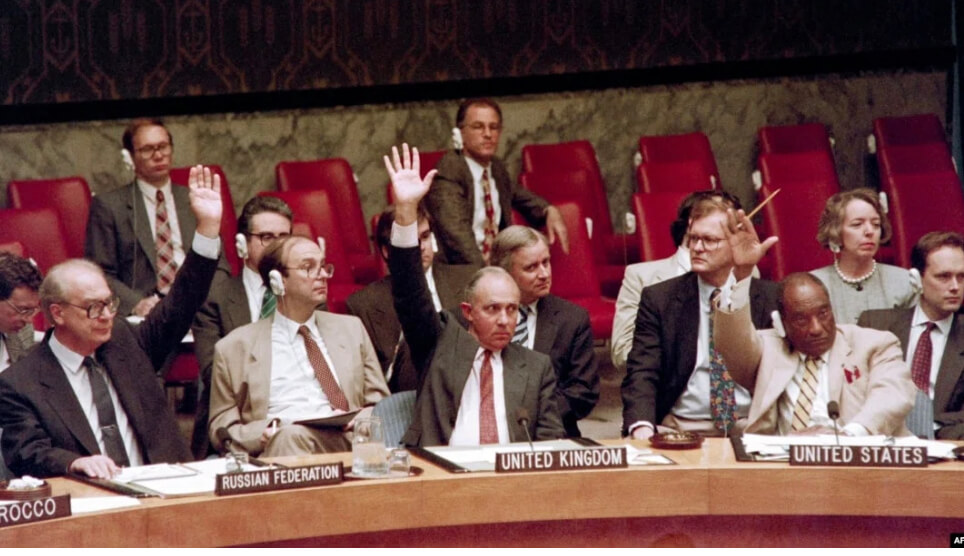Russia is protecting Serbia’s interests regarding Kosovo at the UN, and especially in the Security Council, it goes without saying. As if it is a law of nature, proven long ago and permanent. Special care is taken to ensure that this “legality” is not checked, because – that’s the way things stand, it was “written down” a long time ago and will last forever.
Unfortunately, this has not been the case for a long time, Russia has so far provided a lot of evidence that it does not care much for the Serbian interests regarding Kosovo, and Serbia has had many opportunities to disprove the “legality” that few remember in the first place. The latest proof of Russia’s belittling of Serbian politics regarding Kosovo was provided this week by Ambassador to the UN Vasily Nebenzya at the session of the UN Security Council. He defended the right of the separatist and occupied areas in Ukraine to hold a referendum and join Russia. Clearly, for Moscow it is the highest state interest, not only at this moment, but also in the past. The occupation of Ukraine and the tearing off of its eastern parts is also the main war goal of Russian aggression against Ukraine.
In order to prove the legality and integrity of the referendum in Donetsk, Luhansk, Zaporizhzhia and Kherson, Ambassador Nebenzya brought up the case of Kosovo, but not in a way that Serbia would be satisfied with. It’s completely opposite; Russia puts a sign of equality between the case of Kosovo and the four Ukrainian occupied areas in the Security Council, accusing the West of “double standards”, because it accepts Kosovo’s secession, but not the secession in Ukraine.
It was a direct demonstration of what Russia is actually doing in the Security Council with the Serbian policy regarding Kosovo – it is trampling and unscrupulously abusing it for its supreme interest, which is the occupation and dismemberment of Ukraine. Will there be a place to hear the famous, automated expression after this last performance of Russia at the UN – Moscow defends Serbian interests regarding Kosovo? Unfortunately, it will be used many more times, in Belgrade, and especially in Moscow, but it will sound even more like an empty shell, like never before.
There have been many occasions so far, because of which Ambassador Nebenzya’s performance should not be considered a surprise. He only repeated the views expressed by his bosses – Vladimir Putin, Sergey Lavrov and a number of diplomatic officers subordinate to them. The news can only be Russia’s abuse of Kosovo reaching the Security Council, a place that is most often mentioned as the field where Russia practically shows how it protects Serbian interests. From now on, even that mantra can no longer pass, because the complete opposite is happening – Russia is working directly against Serbia’s interests in relation to Kosovo in the Security Council.
Words of understanding will once again be produced in Moscow, and among pro-Russian politicians in Serbia, and everyone will stick even more firmly to the tried-and-tested story about Russia as the protector. But the delusion will only be greater (in Serbia), and the deception even more brutal (in Russia).
When it comes to interstate friendship between Russia and Serbia, a not-so-old historical analogy emerges here. In March 1937, the Kingdom of Yugoslavia and Mussolini’s fascist Italy concluded the Non-Aggression and Friendship Agreement. It seemed that with this pact, the two countries put an end to mutual tensions, especially regarding the respect of borders, and the commitment to eternal friendship. That “eternal” lasted four years.
Since February 24, when the Russian army invaded sovereign Ukraine, Serbia had to know that it could no longer have a partner in Russia to rely on when defending its sovereignty and Kosovo within its borders. Serbia should have known even before that, but the beginning of the aggression against Ukraine was the point at which the separation of the “eternal friends” was inevitable. When Putin decided to mobilize 300,000 soldiers, and especially when he threatened with nuclear bombs, as the first atomic leader who ever said that, it was more than clear that Serbia must not be in company with him.
That is why the decision to sign a diplomatic consultation plan with Russia for the next two years during the session of the UN General Assembly is incomprehensible. The document is a low-class diplomatic routine that doesn’t even deserve to be in the news and there is “nothing special” in it as Christopher Hill said after reading the document. But all the more, why was it necessary for Serbia to sign it in the first place at a time when the country with which it is planning joint affairs suffers almost unanimous condemnation at the UN for its aggression and is isolated from the most important world trends? What did Serbia get with this pompous signing, by the two heads of diplomacy, in front of cameras and photographers? Nothing, except heavy condemnations by its really important partners, America and the European Union, and opening the door to new suspicions and even restrictive measures from those same partners.
The winner, once again, is only Russia and its regime, whose aggressive and threatening policy can no longer be comprehended even by those who tolerated it until recently. After the New York signing, Serbia remains one of the few countries that stand by Russia and it shows it in action at times when Russia is explicitly working against Serbia and its main national interest in the Security Council. This was not about courage to stand by a “friend” in spite of everything, because it was proven that there is no friendship, and working for the benefit of one’s own harm is far from both courage and logic. Canceling Russia’s “good services” at the UN, and elsewhere, is a matter of urgent priority for Serbia, and procrastination only brings more damage. Canceling this kind of “protection” is, in fact, true courage.
